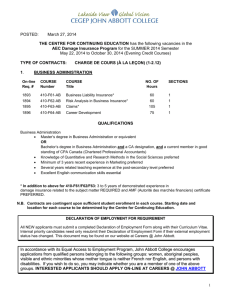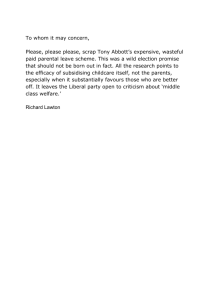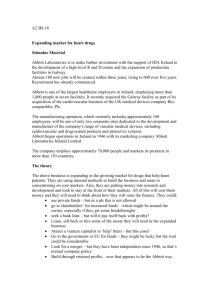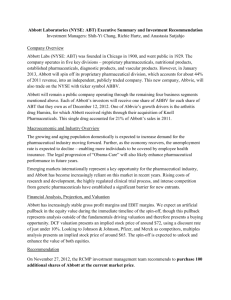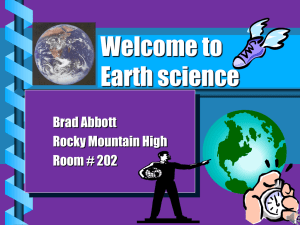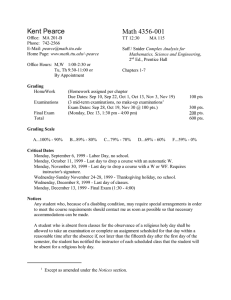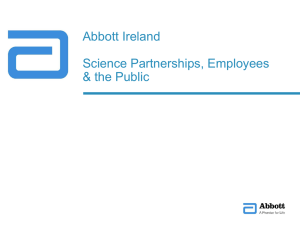Syllabus GEOS 218 – Geological Disasters and Society Fall 2012
advertisement
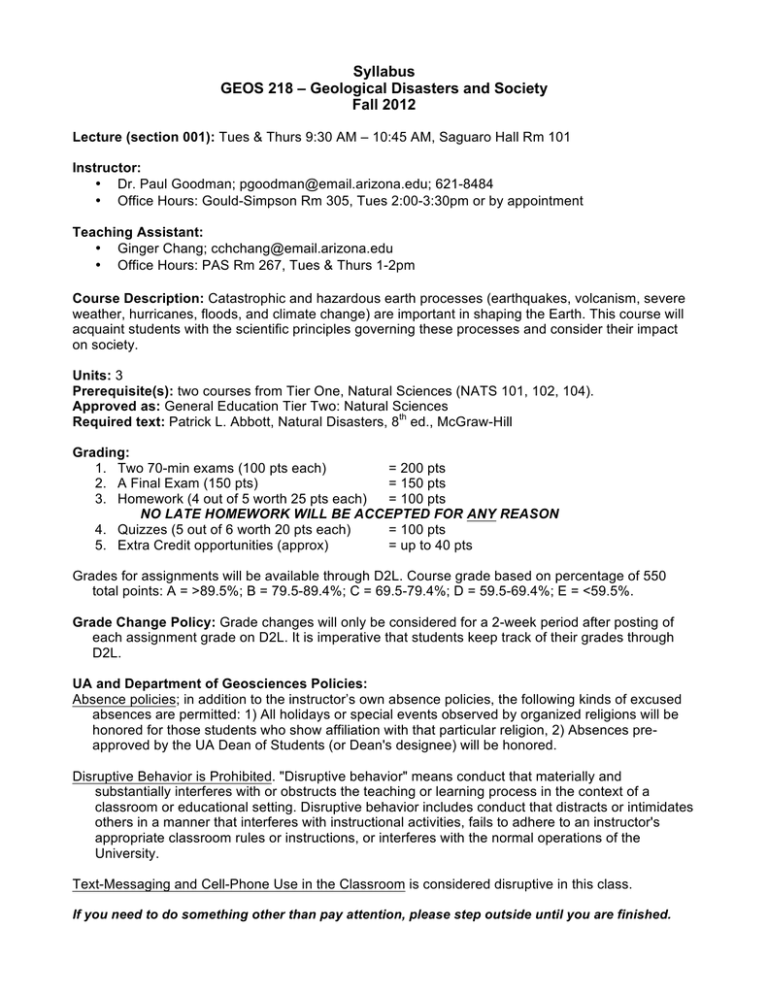
Syllabus GEOS 218 – Geological Disasters and Society Fall 2012 Lecture (section 001): Tues & Thurs 9:30 AM – 10:45 AM, Saguaro Hall Rm 101 Instructor: • Dr. Paul Goodman; pgoodman@email.arizona.edu; 621-8484 • Office Hours: Gould-Simpson Rm 305, Tues 2:00-3:30pm or by appointment Teaching Assistant: • Ginger Chang; cchchang@email.arizona.edu • Office Hours: PAS Rm 267, Tues & Thurs 1-2pm Course Description: Catastrophic and hazardous earth processes (earthquakes, volcanism, severe weather, hurricanes, floods, and climate change) are important in shaping the Earth. This course will acquaint students with the scientific principles governing these processes and consider their impact on society. Units: 3 Prerequisite(s): two courses from Tier One, Natural Sciences (NATS 101, 102, 104). Approved as: General Education Tier Two: Natural Sciences Required text: Patrick L. Abbott, Natural Disasters, 8th ed., McGraw-Hill Grading: 1. Two 70-min exams (100 pts each) = 200 pts 2. A Final Exam (150 pts) = 150 pts 3. Homework (4 out of 5 worth 25 pts each) = 100 pts NO LATE HOMEWORK WILL BE ACCEPTED FOR ANY REASON 4. Quizzes (5 out of 6 worth 20 pts each) = 100 pts 5. Extra Credit opportunities (approx) = up to 40 pts Grades for assignments will be available through D2L. Course grade based on percentage of 550 total points: A = >89.5%; B = 79.5-89.4%; C = 69.5-79.4%; D = 59.5-69.4%; E = <59.5%. Grade Change Policy: Grade changes will only be considered for a 2-week period after posting of each assignment grade on D2L. It is imperative that students keep track of their grades through D2L. UA and Department of Geosciences Policies: Absence policies; in addition to the instructor’s own absence policies, the following kinds of excused absences are permitted: 1) All holidays or special events observed by organized religions will be honored for those students who show affiliation with that particular religion, 2) Absences preapproved by the UA Dean of Students (or Dean's designee) will be honored. Disruptive Behavior is Prohibited. "Disruptive behavior" means conduct that materially and substantially interferes with or obstructs the teaching or learning process in the context of a classroom or educational setting. Disruptive behavior includes conduct that distracts or intimidates others in a manner that interferes with instructional activities, fails to adhere to an instructor's appropriate classroom rules or instructions, or interferes with the normal operations of the University. Text-Messaging and Cell-Phone Use in the Classroom is considered disruptive in this class. If you need to do something other than pay attention, please step outside until you are finished. Policies against threatening behavior by students: The University seeks to promote a safe environment where students and employees may participate in the educational process without compromising their health, safety or welfare. The Arizona Board of Regents’ Student Code of Conduct, ABOR Policy 5-308, prohibits threats of physical harm to any member of the University community, including to one’s self. Threatening behavior can harm and disrupt the University, its community and its families. Threatening Behavior is Prohibited. ‘Threatening behavior’ means any statement, communication, conduct or gesture, including those in written form, directed toward any member of the University community that causes a reasonable apprehension of physical harm to a person or property. A student can be guilty of threatening behavior even if the person who is the object of the threat does not observe or receive it, so long as a reasonable person would interpret the maker’s statement, communication, conduct or gesture as a serious expression of intent to physically harm. If threatened by any student’s conduct to the point of reasonable fear of immediate physical harm to self, others or property: 1. Leave the area immediately. 2. Call the Police by dialing 9-1-1 to request that an officer come to the location. Inform the Police if it is a repeat occurrence. 3. Anyone who observes what appears to be threatening behavior must report it to the Dean of Students Office and in the appropriate case file a Student Code of Conduct Complaint (see ABOR 5-403).” University policy is found at http://policy.web.arizona.edu/~policy/threaten.shtml. Students with Disabilities: If you anticipate barriers related to the format or requirements of this course, please meet with me so that we can discuss ways to ensure your full participation in the course. If you determine that disability-related accommodations are necessary, please register with Disability Resources (621-3268; drc.arizona.edu) and notify me of your eligibility for reasonable accommodations. We can then plan how best to coordinate your accommodations. STUDENT GUIDELINES FOR INDIVIDUAL AND GROUP WORK Department of Geosciences, University of Arizona Academic Year 2012-2013 1. Underlying Principle Unless specified in the assignment, all work and all words used to describe the results of an assignment must be the student’s own. No material, whether paragraphs, sentences or phrases may be copied from another student or from any external source. External material that is used, usually for a specific reason, must be accompanied by a citation of the source. 2. Individual Assignments In some cases, students will be told that no conferring is allowed; if that is the case, students must not discuss their work with others, or show others their work. More often, Geosciences faculty will encourage discussion among students, because this facilitates learning. In such a case, any ideas and concepts may be discussed openly, but the student is still responsible for his/her own work turned in for grading. Identical paragraphs, sentences, phrases, or notations on a map/illustration may not be used by two or more students. The best way to avoid this is for students to discuss the assignment, but then separate from each other in order to produce the work to be turned in for grading, and not share electronic files using e-mail, flash drives or other method. 3. Group Assignments Geosciences faculty routinely give two kinds of group assignments. Category 1 is a group assignment where students work in parallel on the same material (for instance a mapping exercise), but then turn in individual work for grading. Discussion is encouraged, but it is essential that each student first perform the written or map work individually, after which ideas may be exchanged and interpretations modified before the work is graded. Copying of another’s work is prohibited, and this can be avoided in the same way as for individual assignments. Category 2 is a group assignment where students work explicitly as teams, perhaps with each member performing parts of a complex task (such as a geophysical or analytical experiment), and a combined product will be graded with equal scores for all members of the team. In this case, full discussion of the work, before any write-up takes place, is expected. The instructor will inform students whether a group assignment is Category 1 or 2. 4. Reporting of Cheating All incidents of cheating or plagiarism, including facilitating of same, will be reported to the Dean of Students’ office and the College of Science. As well as the violations in take-home or field assignments detailed above, this will include any violations during quizzes and exams. The University’s procedure and forms give students an opportunity to explain to the instructor, and to comment upon (or rebut) any accusations in writing before the forms are turned in. But the forms can be turned in, reporting the cheating incident, even if the student fails to meet with the instructor or does not countersign the paperwork. 5. Expectation of Student Integrity Instructors in the Department of Geosciences set a high standard for themselves as educators, and they expect that students, both in general education and majors’ classes, will do the same for their own education. Thus cheating and plagiarism will not be tolerated. 6. UA Code of Academic Integrity This document is a statement of what students and faculty should expect within Department of Geosciences, or in general education courses offered by the Department. It does not replace the UA’s Code of Academic Integrity, which can be read in full at: http://deanofstudents.arizona.edu/codeofacademicintegrity. GEOS 218: Geological Disasters and Society Fall Semester, 2012 Date Lecture Topic Reading Aug 21 Introduction and Natural Hazards Abbott Ch1 Aug 23 Internal Energy & Plate Tectonics Abbott Ch2 Aug 28 Plate Tectonics Basics Abbott Ch2 Aug 30 Earthquake Geology & Seismology Abbott Ch3 Sep 4 Earthquakes & Plate Tectonics Abbott Ch4 Sep 6 Earthquake Lessons Abbott Ch5 Sep 11 Tsunamis Abbott Ch8 Sep 13 Movie: Tsunami Japan’s Killer Quake (2011) Sep 18 Significant Earthquakes Homework #1 due Sep 20 Wrap-up and Review Sep 25 EXAM #1 _____________________________________________________________________ Sep 27 Oct 2 Oct 4 Oct 9 Oct 11 Oct 16 Volcanic Eruptions Volcanic Eruptions: Case Histories Movie: Pinatubo In the Path of a Killer Volcano Volcanic Hazards Yellowstone & Long Valley External Energy, Weather & Climate Abbott Ch6 Abbott Ch7 Abbott Ch7 Abbott Ch9 Homework #2 due Abbott Ch10 Oct 18 Severe Weather Oct 23 Wrap-up and Review Oct 25 EXAM #2 _______________________________________________________________________ Oct 30 Hurricanes Abbott Ch11 Homework #3 due Nov 1 Movie: Katrina The storm that drowned a city Nov 6 Climate Change Abbott Ch12 Nov 8 Movie: A Global Warning? Nov 13 Climate Change Abbott Ch12 Nov 15 Floods Abbott Ch13 Homework #4 due Nov 20 Fires Abbott Ch14 Nov 22 No class - Thanksgiving Nov 27 Landslides & Impacts Abbott Ch15 & 16 Nov 29 Disasters & Society Dec 4 Wrap-up and Review Homework #5 due Dec 12 FINAL EXAM (10:30-12:30) _______________________________________________________________________ (Schedule as of 15 Aug 2012 - subject to moderate revision)
